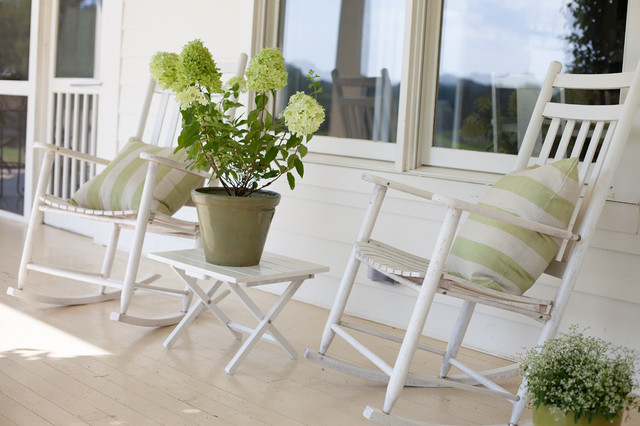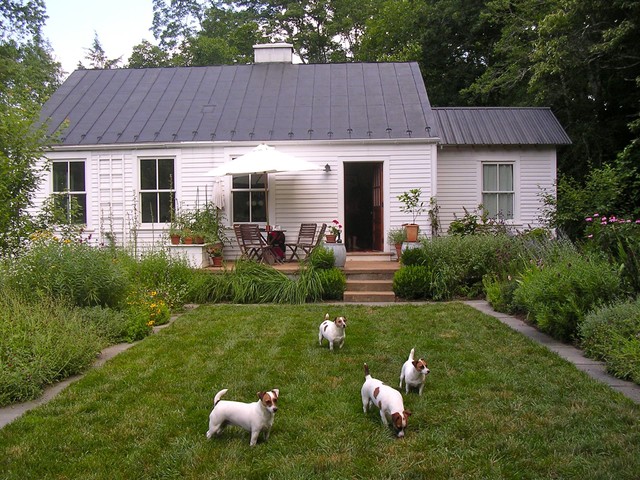How to Get Along With the Neighbors — and Live Happier at Home
Getting along (or not getting along) with neighbors can make a huge impact on our daily lives and how we feel about our home and neighborhood. Whether you live in the city, the country or somewhere in between, learning the art of being neighborly is something that can benefit us all. Here are eight ways to navigate the etiquette of being a good neighbor. When you're done reading, go pour yourself something tasty to drink and sit on the porch for a spell.
|
by Adrianna Beech
»
|
|
1. Be friendly. If you are
new to the neighborhood, a friendly smile and hello can go a long way
toward establishing rapport with neighbors. Introduce yourself when you
run into a neighbor you haven't met yet. And if you've been there awhile
and someone new has just moved in, a small gift, like home-baked goods
(or a treat from a favorite local shop), is a thoughtful way to welcome
him or her.
|
If it's your neighbors who are being too noisy, your first step should be a polite knock on the door. Tell them, without sounding angry, that you understand they are having a great time, have friends visiting etc., but it's getting too loud for you, and could they please turn the music down or take the party indoors after a time you feel is appropriate? Be sure to thank them when they do what you've asked.
Remember, your neighbor is likely not going anywhere, so even if you do not particularly like him or her, it is in your interest to find a way to get through it together.
On a related note, don't gossip about other neighbors! It may feel like bonding to complain about shared problems, but gossiping generally only deteriorates relationships.
|
|
|
4. Be reasonable about pets.
This can be a big point of contention among neighbors, so try to tread
lightly whether you are the pet owner or the one being bothered by a
neighbor's pets. If something happens once or twice — loud barking, poop
on your lawn etc. — take a deep breath (well, maybe step away from the
poop first ...) and let it go. If there is an ongoing problem, discuss
it directly with your neighbor. Even if you are upset, try to think of
something kind to say about your neighbor's pet before launching into
the complaint section of your talk.
For pet owners, if a neighbor approaches you with a complaint about your animals, do your best to listen and acknowledge their feelings. Assure them you will do what you can to remedy the situation — scoop the poop, keep your dog on a leash, repair the fence and pay for training if needed. |
Raise Chickens Without Ruffling Feathers
|
5. Respect common spaces and shared walls. Keep
shared hallways, entrances, and common rooms in your apartment or condo
clear of personal belongings. Even though space may be tight inside
your unit, it's important to find another place for that stroller or
bicycle — crowded common areas can become a fire hazard, or at least a
tripping hazard.
If you share walls (or a floor or ceiling) with neighbors, try to keep noise down to a reasonable level all the time, not just late in the evening. If you live upstairs, consider using area rugs over hard flooring to muffle the noise of footsteps — a common complaint among downstairs neighbors. |
|
6. Keep your front yard tidy.
There is no need to get into a competition with neighbors over who has
the greenest lawn, but keeping up a basic level of tidiness will be
appreciated by all. Put your garbage and recycling cans back promptly
after they have been collected, keep grass mowed and weeds pulled, and
try to avoid storing too many belongings on your porch or in the
driveway.
7. Follow local parking etiquette. Always try to park in front of your own house if possible, and never block neighbors' driveways. In some neighborhoods with narrow streets, it is the custom for everyone to park on only one side — even if it's not an official rule, it is best to follow suit. |
|
8. Build community. Building good relationships with neighbors often comes down to the little things. If your garden produces a bumper crop of tomatoes,
bring a basket next door to share. Trade tools and skills. Be generous
with smiles and be willing to lend a hand if it's needed. And you don't
need to be part of a neighborhood watch to help keep your neighborhood
feeling a bit safer — simply knowing your neighbors and occasionally
chatting with them can go a long way. Let your immediate neighbors know
if you will be out of town, and whether you will be having anyone stay
at your home while you are gone.
If your neighborhood doesn't already have any events, consider organizing one. Annual events like a block party, an open house or a neighborhood yard sale are a great way to build a sense of community and get to know your neighbors. |








